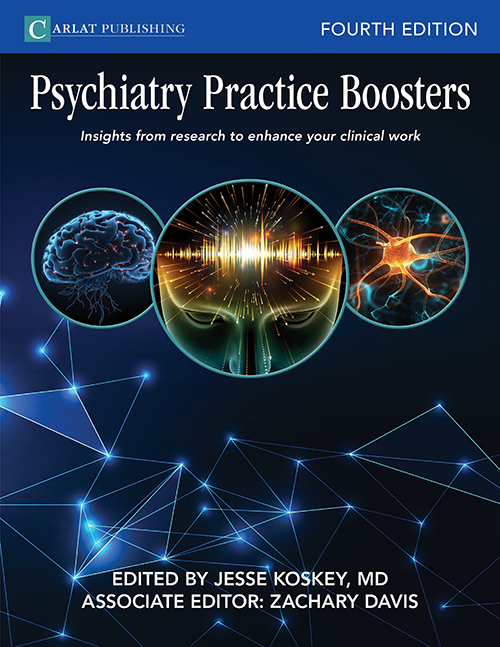Home » Citalopram Plus Stimulants for Chronic Irritability?
Citalopram Plus Stimulants for Chronic Irritability?
July 14, 2021
From The Carlat Child Psychiatry Report
Eric Robbins, MD.
Dr. Robbins has disclosed no relevant financial or other interests in any commercial companies pertaining to this educational activity.
REVIEW OF: Towbin K et al, J Am Acad Child Adolesc Psychiatry 2020;59(3):350–361
STUDY Type: Randomized controlled trial
Chronic irritability in youth is ever-present in daily practice. Currently called disruptive mood dysregulation disorder (DMDD) in the DSM-5, there is an ever-evolving debate about how to treat this condition, but no definitive conclusion. While there are some encouraging studies of parent management training and cognitive behavioral therapy for DMDD, this small but double-blind placebo-controlled study tried to illuminate possible pharmacological options.
The National Institute of Mental Health (NIMH) conducted an 8-week randomized controlled trial of 53 youth (ages 7–17 years old) with DMDD, in which 25 patients were randomized to stimulants plus adjunctive citalopram (Celexa), and 28 patients were randomized to stimulants plus placebo. The authors argued that since ADHD, anxiety, and depression are often comorbid with DMDD, methylphenidates and citalopram were chosen, although specific reasons for those choices were not noted. There was a 5-week lead-in phase in which all participants received stimulants. Children who remained symptomatic entered the randomized part of the trial. The average dosage of citalopram was 28.33 mg per day. Out of the 53 participants randomized to the trial, 8 did not complete it, 7 of whom withdrew assent during the study.
Citalopram significantly outperformed placebo on the primary outcome of Clinical Global Impression – Improvement (CGI-I): 35% vs 6% with an NNT of 3. However, there was no significant difference in secondary outcomes of Clinical Global Impression – Severity (CGI-S) and functional impairment. Both of these are markers of ongoing severity of condition and arguably more important markers of response, but neither showed statistically significant differences between the two groups.
CCPR’s Take
While therapy remains the first-line treatment for DMDD, methylphenidate may be of some help, and if the response is not adequate, citalopram may be a reasonable adjunct to try.
Child PsychiatrySTUDY Type: Randomized controlled trial
Chronic irritability in youth is ever-present in daily practice. Currently called disruptive mood dysregulation disorder (DMDD) in the DSM-5, there is an ever-evolving debate about how to treat this condition, but no definitive conclusion. While there are some encouraging studies of parent management training and cognitive behavioral therapy for DMDD, this small but double-blind placebo-controlled study tried to illuminate possible pharmacological options.
The National Institute of Mental Health (NIMH) conducted an 8-week randomized controlled trial of 53 youth (ages 7–17 years old) with DMDD, in which 25 patients were randomized to stimulants plus adjunctive citalopram (Celexa), and 28 patients were randomized to stimulants plus placebo. The authors argued that since ADHD, anxiety, and depression are often comorbid with DMDD, methylphenidates and citalopram were chosen, although specific reasons for those choices were not noted. There was a 5-week lead-in phase in which all participants received stimulants. Children who remained symptomatic entered the randomized part of the trial. The average dosage of citalopram was 28.33 mg per day. Out of the 53 participants randomized to the trial, 8 did not complete it, 7 of whom withdrew assent during the study.
Citalopram significantly outperformed placebo on the primary outcome of Clinical Global Impression – Improvement (CGI-I): 35% vs 6% with an NNT of 3. However, there was no significant difference in secondary outcomes of Clinical Global Impression – Severity (CGI-S) and functional impairment. Both of these are markers of ongoing severity of condition and arguably more important markers of response, but neither showed statistically significant differences between the two groups.
CCPR’s Take
While therapy remains the first-line treatment for DMDD, methylphenidate may be of some help, and if the response is not adequate, citalopram may be a reasonable adjunct to try.
Issue Date: July 14, 2021
Table Of Contents
Recommended
Newsletters
Please see our Terms and Conditions, Privacy Policy, Subscription Agreement, Use of Cookies, and Hardware/Software Requirements to view our website.
© 2025 Carlat Publishing, LLC and Affiliates, All Rights Reserved.


_-The-Breakthrough-Antipsychotic-That-Could-Change-Everything.jpg?1729528747)



